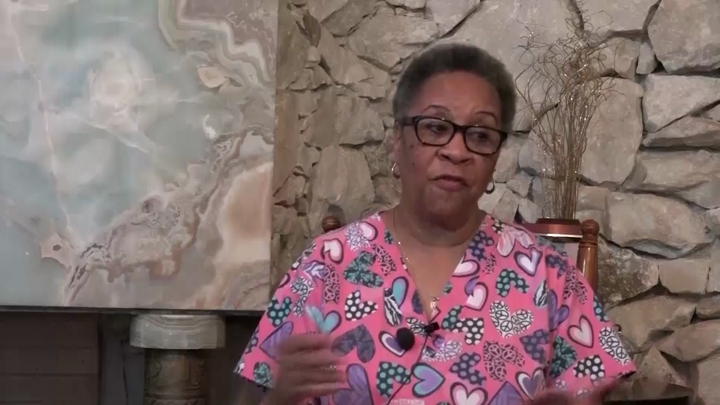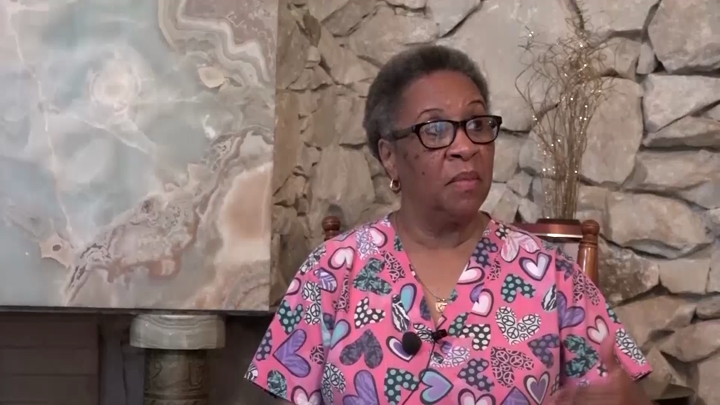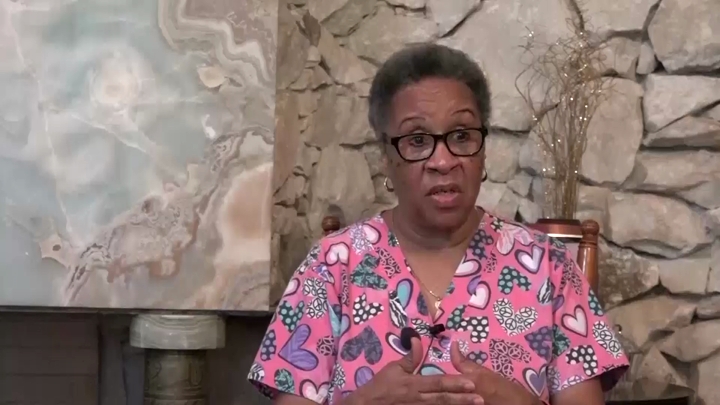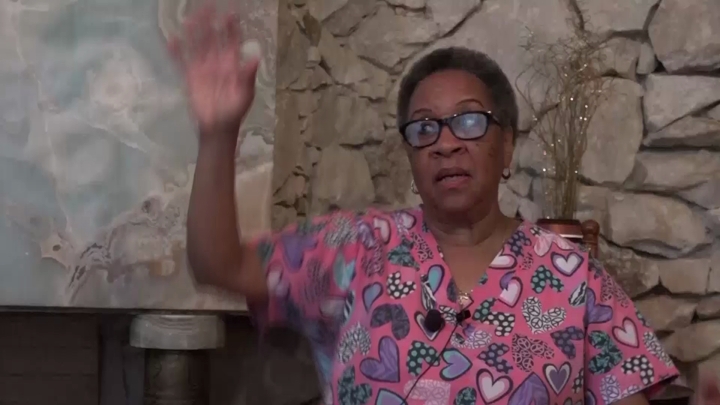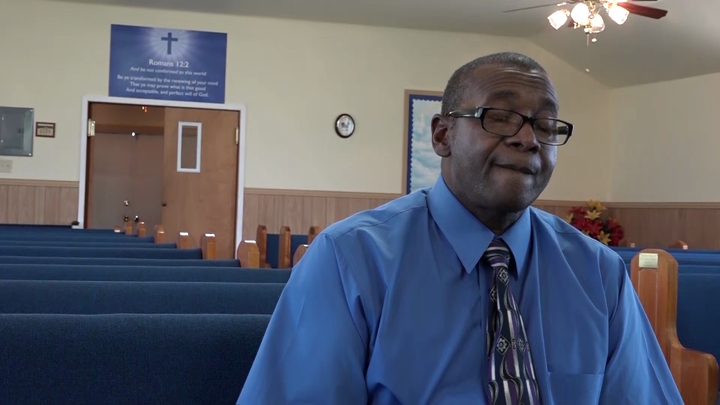Abdullah / Protests and Marching, Part Two
sign up or sign in to add/edit transcript
Helena Abdullah: I was very impressed, but I was a hot head. I didn’t have anything kind to say about the people here because this paper had not interviewed us. It had not called anybody to find out what are you marching for? What are we fighting for? Why are y’all out there in the street? They didn’t want to know anything. When I made mention of that, I got an interview with Victor Fame. The last paper, the Nacogdoches paper. We needed change like everybody else. We’re paying taxes like everybody else. There are no decrease in taxes or breaks because you’re black. You pay taxes. There’s no discount at the grocery store. There’s no discount at JC Penney’s. There’s no discount at J.B. Whites. There’s no discount at McCrory's. There’s no discount at Perry’s. You paying the same thing whites are paying, why can’t we work here? We wanted some change. Change did come. Interviewer: Y’all forced it. (laughs) Helena Abdullah: Forced the change. The thing about it is, I remember—I’m not going to call her name—a young lady that started working at the water company, the first black there, wouldn’t even come march with us but she benefited. It’s okay. It’s kind of okay. At least you got a black in there, but she wouldn’t even march with us. Interviewer: So, Mickey McGuire has come up a lot. What was your first, if you can remember, your first interaction with him? Helena Abdullah: I thought he was brilliant. I thought he was fearless, but I didn’t know he was a nut. I say that kindly because he had worked movements before. He had been out there. He was doing a lot of stuff. So, he came here to where there were a bunch of country bumpkins that were trying to make some change but didn’t really know how so he helped us to get organized. We knew how to get the marches started, just a handful of us. He was the one who knew the contacts. This is who you call. That’s who you call there. This is who you need to get ahold of. You need to get these people down here. He was the one with more resources to help us. Interviewer: How did he end up in the area? Helena Abdullah: If I’m not mistaken, Beverly, the young lady from Houston, is the one that called him. She had seen his name in a paper or she had heard him speak in Houston because she went to Texas Southern for some kind of march and when she contacted him there she said we need you in Nacogdoches where I’m going to school at SFA. And he came. Interviewer: Was he affiliated with any organization? Helena Abdullah: No, he was just one of, back then they called them mobilizers. Pretty much. Interviewer: So, he was just known for his ability to mobilize people? Helena Abdullah: To mobilize people and try to get change done and try to do it in a peaceful way. Interviewer: When did he come to SFA? Helena Abdullah: He came during the second march. Interviewer: And he was older? Helena Abdullah: Yeah, if I was nineteen, he had to been forty. He had to be at least forty at the time. Interviewer: Prior to Mickey McGuire getting there, you had your first march. You kind of mentioned your motivation but could you talk about what motivated your first march? Helena Abdullah: The motivation was the inequality, things that were going on here. Plus, Mr. Weaver was supporting us as well because people that talked to him about things that happened on other—he couldn’t divulge a lot the information to us because he was working behind the scenes with the NAACP to get some change for people. There were some things going on on the jobs here. I think at one particular time that he may have had four or five people that he was working cases on. In all of this that we were doing trying to get stuff going over at SFA, it just happened to coincide with stuff that needed to be going on in the city. We realized all of us needed to work together. We were a powerful force together. Standing alone we were just jibber-jabbering. I mean, nobody’s going to be afraid of that force. It wasn’t until after the first march that we started the boycott. I don’t know if it was Mr. Weaver’s idea or if it was Mickey McGuire’s idea, but it was very effective because after the march and after the boycott started, people were going to Tyler and Lufkin to shop. You would not find a black downtown. Interviewer: You said the first march happened in Spring 1969. What was the reaction, well, how many people participated? Helena Abdullah: That first march we probably had two hundred people or better. Interviewer: How did y’all get that many people to come? Helena Abdullah: Word of mouth. We told everybody where to meet, what time we were going to start. We got permission from the city for the march. We were going to march through town and come to SFA. I’m sure they thought we’ll just let these little old people have their first little march. They probably didn’t think it was going to culminate into anything, but it grew bigger after that. The second march, what I was told, was more close to three hundred or better people. The last one was about two hundred also, but we didn’t do anything on that third one, as I said, because it was too dangerous. Interviewer: What was the response of police and administration to the first march? Helena Abdullah: You know, we got cooperation the first march. I don’t remember any incidents off hand that happened. It was a peaceful march. It was mostly going up to the campus and having a rally and it was peaceful all the way. Lots of us. There were a lot of people looking and watching, black and white, but it didn’t end up with any violence or anything. Interviewer: What was the black community’s response to y’all marching the first time? Helena Abdullah: When we told them we were going to march, I can remember older blacks telling me I was crazy. You don’t need to be out there doing anything like that. Well I said if we don’t do it who’s going to? Who’s going to make this change? My grandmother—bless her soul—and my mother said be careful. They supported us in what we were doing. My grandfather had just passed in 1969 or 1968. So, there were no men-folk in my family at that time. They had all passed away, but the ladies in my family were all supportive.
| Interview | Interview with Helena Abdullah |
| Subjects | Community Organizations › Civil Rights Organizations › National Association for the Advancement of Colored People (NAACP) |
| Police and Law Enforcement | |
| Direct Action | |
| Direct Action › Marches | |
| Direct Action › Rallies | |
| Student Activism | |
| Student Activism › Sit-ins › Student Demands for Jobs | |
| Student Activism › Student Organizations | |
| Direct Action › Protests | |
| Tags | McGuire, Mickey |
| Stephen F. Austin State University | |
| Texas Southern University | |
| Weaver, Arthur | |
| sign up or sign in to add/edit tags | |
| Interview date | 2016-06-30 |
| Interview source | CRBB Summer 2016 |
| Interviewees | Abdullah, Helena |
| Interviewers | Howard, Jasmin |
| Locations | Nacogdoches, TX |
| Duration | 00:06:40 |
| Citation | "Protests and Marching, Part Two," from Helena Abdullah oral history interview with Jasmin Howard, June 30, 2016, Nacogdoches, TX, Civil Rights in Black and Brown Interview Database, https://crbb.tcu.edu/clips/2417/protests-and-marching-part-two, accessed March 01, 2026 |


